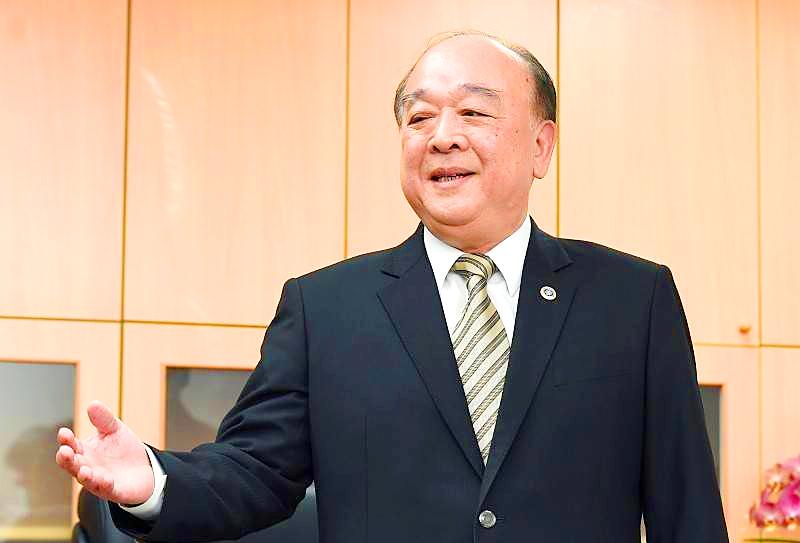Democratic Progressive Party (DPP) lawmakers yesterday expressed concern over the Chinese Nationalist Party (KMT) assigning Wu Sz-huai (吳斯懷), a legislator-at-large and retired lieutenant general, to the Foreign Affairs and National Defense Committee in the legislature’s upcoming session.
Wu attracted controversy in 2016 for attending the commemoration of Sun Yat-sen’s (孫逸仙) 150th birthday in China, during which he listened to a speech by Chinese President Xi Jinping (習近平) and stood as participants sang the Chinese national anthem.
“Wu has been publicly criticized for what he has said about national defense issues and cross-strait relations,” DPP caucus secretary-general Cheng Yun-peng (鄭運鵬) said.

Photo: Taipei Times
“For this legislative session, DPP members will remain on high alert when participating in committee sessions,” he added.
DPP caucus deputy secretary-general Lin Ching-yi (林靜儀) questioned the KMT’s motives.
“Does Wu want to access classified military documents and budget items? I think the public has misgivings about the KMT’s motives,” she said.
“The KMT should take responsibility for his stances on national defense and foreign affairs. If serious breaches take place, the KMT must be held accountable,” she said.
Wu said that people must not question his loyalty to the Republic of China.
“If I leaked state secrets or betrayed the country, there would be severe punishment, even execution by firing squad,” he said.
Wu has been invited to sit on the committee for his military expertise, KMT caucus whip Tseng Ming-chung (曾銘宗) said.
“Why is the DPP afraid of Wu serving on the committee? If he contravenes the law in committee proceedings, the judiciary has the legal authority to investigate him,” he said.
Additional reporting by Chen Yun

NUMBERS IMBALANCE: More than 4 million Taiwanese have visited China this year, while only about half a million Chinese have visited here Beijing has yet to respond to Taiwan’s requests for negotiation over matters related to the recovery of cross-strait tourism, the Tourism Administration said yesterday. Taiwan’s tourism authority issued the statement after Chinese-language daily the China Times reported yesterday that the government’s policy of banning group tours to China does not stop Taiwanese from visiting the country. As of October, more than 4.2 million had traveled to China this year, exceeding last year. Beijing estimated the number of Taiwanese tourists in China could reach 4.5 million this year. By contrast, only 500,000 Chinese tourists are expected in Taiwan, the report said. The report

Temperatures are forecast to drop steadily as a continental cold air mass moves across Taiwan, with some areas also likely to see heavy rainfall, the Central Weather Administration (CWA) said. From today through early tomorrow, a cold air mass would keep temperatures low across central and northern Taiwan, and the eastern half of Taiwan proper, with isolated brief showers forecast along Keelung’s north coast, Taipei and New Taipei City’s mountainous areas and eastern Taiwan, it said. Lows of 11°C to 15°C are forecast in central and northern Taiwan, Yilan County, and the outlying Kinmen and Lienchiang (Matsu) counties, and 14°C to 17°C

SHIPS, TRAINS AND AUTOMOBILES: The ministry has announced changes to varied transportation industries taking effect soon, with a number of effects for passengers Beginning next month, the post office is canceling signature upon delivery and written inquiry services for international registered small packets in accordance with the new policy of the Universal Postal Union, the Ministry of Transportation and Communications said yesterday. The new policy does not apply to packets that are to be delivered to China, the ministry said. Senders of international registered small packets would receive a NT$10 rebate on postage if the packets are sent from Jan. 1 to March 31, it added. The ministry said that three other policies are also scheduled to take effect next month. International cruise ship operators

STEERING FAILURE: The first boat of its class is experiencing teething issues as it readies for acceptance by the navy, according to a recent story about rudder failure The Hai Kun (海鯤), the nation’s first locally built submarine, allegedly suffered a total failure of stern hydraulic systems during the second round of sea acceptance trials on June 26, and sailors were forced to manually operate the X-rudder to turn the submarine and return to port, news Web site Mirror Daily reported yesterday. The report said that tugboats following the Hai Kun assisted the submarine in avoiding collisions with other ships due to the X-rudder malfunctioning. At the time of the report, the submarine had completed its trials and was scheduled to begin diving and surfacing tests in shallow areas. The X-rudder,